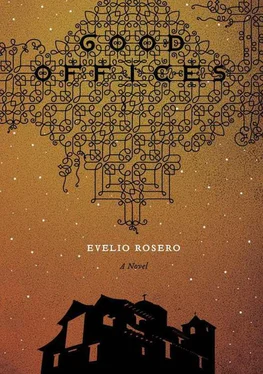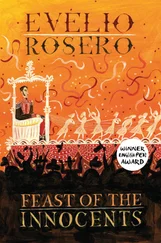“Tancredo,” Father Almida said, pouring a little hazelnut
liqueur into his coffee, “have you lost your mind?” He blinked rapidly. Then, though his expression calmed, his voice continued to admonish. “What is the matter with you? What’s all this about the old not believing, and not heeding my missives? Who are you to claim such a thing? Do you have telepathic gifts? Can you see inside their heads? What do you know? I’m the one who hears their confessions, for God’s sake, Tancredo.” He took a sip of coffee. He huffed. Now he couldn’t help smiling. “Besides,” he said provocatively, “if you have important things to say, you must say them in Latin. Why else have we learned it? We are never going to believe you otherwise.” He passed a hand over his face, clearly preoccupied. “Well,” he sighed, “we’ll talk about this tomorrow. I think we need to hear your confession, don’t we? And today you will have to assist at Mass. Father Fitzgerald won’t be long. He will officiate, and you shall be his acolyte. Just for today.”
The sacristan was listening carefully, turning his right ear in Almida’s direction, even cupping one of his wrinkled, trembling hands around it.
“One should never refuse the honor of being an acolyte,” he said, without addressing Tancredo directly, of course. He spoke angrily, bitterly, his rage barely suppressed.
“He has not refused,” the Father said.
Sabina stood up and poured more coffee into Machado’s cup. Her hand shook. For a moment Tancredo thought she was going to spill the hot liquid. No doubt she had just understood that Almida and Machado really would be absent from the church, who knew until what time, and that she and he would be alone, after Mass, because he would be serving as acolyte, an office he had not performed in a long time — the last time had been on Easter Sunday when he was just fifteen. Which meant that Sabina and he would end up alone in the presbytery for the first time in ages. This prospect affected her deeply. Flushed, placid, Tancredo watched her pour coffee into all the cups, then return immediately to her chair, as if fleeing. She seemed to be laughing to herself.
“It’s fine with me,” Tancredo said, ignoring the sacristan in his turn. “I remember all the steps perfectly.”
“How could one forget them?” the sacristan asked, continuing to address only the Father. “Even if he were an idiot in addition to what he already is.”
“Please, Celeste.” The Father pushed his cup away. “Here in the office we are still in God’s house, not just in the church. This entire place is God’s house, every nook and cranny, every stick of furniture. We are all the Church. We cannot use words that do not honor the presence of the Almighty.”
He spoke quietly, so of course the sacristan did not hear him; he could not. The Father sometimes spoke this way to his sacristan, with the obvious wish not to be heard, as if on purpose, to express agreement with others without undermining or mocking Machado; he managed things so that Machado did not realize he was taking sides. The sacristan calmly took another sip of coffee.
Tancredo had been an acolyte and altar boy since he was ten years old. He had been relieved of these responsibilities by mutual agreement with the Father. The hunchback offered no resistance, and neither, he thought, did the parishioners. Having become an acolyte out of a sense of obligation, he found pathetic the fear his presence produced in the children (many of whom cried at the sight of him), as well as the cautious mockery of the men and the restrained but evident repugnance felt by the old ladies of the Neighborhood Civic Association. He can find only one appropriate word to describe himself as an altar boy: absurd. More than a hunchback, he supposes, an absurdity — I am, in a word, an absurdity. Not that this stops the sacristan’s goddaughter from kissing my hands and begging me to visit her at night. Such are God’s ironic designs, an imponderable puzzle, but who am I to question them? I cannot, and do not want to remember myself as an altar boy, another of His designs, because the fears return, and hatred, my hatred, grows, without any particular object.
The sacristan, it seemed, was genuinely worried, as was Almida. Something was tormenting them. Outside, the rain fell harder.
“It is my house too,” Almida said suddenly, as if resuming his reflections out loud. Nobody had ever seen him exasperated, so his outburst surprised them all. He not only shouted these words but slammed his hand down on the table: the coffee jug shook, the little cups rattled, the hazelnut liqueur shuddered. The sacristan heard the cry perfectly. “This is my house,” the Father went on. “They have nothing to reproach me for. I do as much good as I can; I consecrate my strength to God; I have spent my whole life in His service. Why come to me with such nonsense? We cannot afford to lose Don Justiniano’s funding. They have filled his head with lies. Everything he gives us we give to the poor. Charity is at the heart of everything we do. If we lose the funding, we lose the Meals.”
“The truth always triumphs,” the sacristan said.
“They are fools,” the Father replied, “and they are priests, flesh of our flesh, spirit of our spirit, yet nevertheless an emblem of evil. They want to swindle us out of our funding, by God. We won’t be the ones to lose out, though. Many of God’s children will suffer. Envy in a priest is three times more sinful. May God forgive them, because I curse them.”
The sacristan was pained not so much by the Father’s words — which he must have heard before — but because he said them in front of Tancredo.
“Father Fitzgerald will be here soon,” Machado said. “The bad weather is holding him up. I rang him from the sacristy, spoke to him personally. We could leave now. He did not indicate that there would be any problems.”
“How could he,” Father Almida countered vehemently, “when I’ve stood in for him on a thousand and one occasions? This is the first time I’ve asked a priest to stand in for me at Mass. The first time in forty years. Forty years,” he repeated, looking at the clock. It was 6:40. “Well,” he said, “my parishioners must be arriving, God bless them. I can’t leave without my replacement being here.”
“Father Fitzgerald is very punctual,” Machado commented.
Tancredo realized that he should go and arrange the sacred utensils on the altar; the sacristan’s eyes were urging him on. He felt as if, without looking at him, they were staring and shouting, “To your duties, dimwit!” Then the office telephone rang. Sabina went to answer it. Astounded, they heard her greeting Father Fitzgerald, which meant he was not even on his way. But then they heard her mention Father Ballesteros. It must be that he was going to replace Father Fitzgerald.
“Mother of God,” Almida said, “this is unheard of. Don Justiniano leaves for the airport in two hours. We barely have time to get to his house and speak to him.” When Sabina had hung up, Almida ordered her to ring Ballesteros. “If they confirm that Father Ballesteros is on his way, we’ll leave, but only if they confirm it, Sabina. You must insist they guarantee that Ballesteros is coming to take my place.”
“Don Justiniano will wait for us,” Machado said.
Almida chose not to favor him with a glance.
“He is a businessman,” he said. “I hope his devotion to the parish will allow him to understand our urgency, our explanations.”
“He’ll wait for as long as he has to.”
“Your mouth to God’s ear,” the Father snapped. His hands met in the air and rubbed together rapidly. He had to speak to Don Justiniano before the businessman left. The parish’s principal funding depended on the results of their meeting.
Читать дальше












